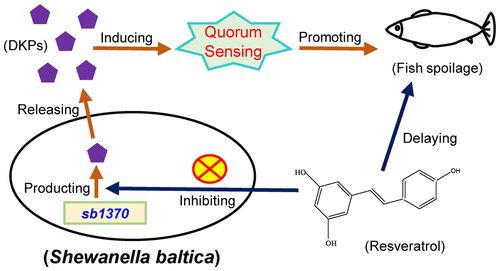当前位置:
X-MOL 学术
›
J. Agric. Food Chem.
›
论文详情
Our official English website, www.x-mol.net, welcomes your
feedback! (Note: you will need to create a separate account there.)
Diketopiperazines Synthesis Gene in Shewanella baltica and Roles of Diketopiperazines and Resveratrol in Quorum Sensing.
Journal of Agricultural and Food Chemistry ( IF 5.7 ) Pub Date : 2019-10-18 , DOI: 10.1021/acs.jafc.9b04620 Junli Zhu 1 , Yuwei Zhang 1 , Jingmin Deng 1 , Hanyun Jiang 1 , Liumin Zhuang 1 , Wei Ye 1 , Jiayu Ma 1 , Jingyang Jiang 1 , Lifang Feng 1
Journal of Agricultural and Food Chemistry ( IF 5.7 ) Pub Date : 2019-10-18 , DOI: 10.1021/acs.jafc.9b04620 Junli Zhu 1 , Yuwei Zhang 1 , Jingmin Deng 1 , Hanyun Jiang 1 , Liumin Zhuang 1 , Wei Ye 1 , Jiayu Ma 1 , Jingyang Jiang 1 , Lifang Feng 1
Affiliation

|
The synthesis pathways of quorum sensing (QS) signal molecules and the mechanism of action of quorum sensing inhibitors (QSIs) have gained considerable attention as research topics in the field of food preservation. Here, Shewanella baltica was detected as the specific spoilage organism in large yellow croaker during 4 °C storage, and it produced the QS signal molecules autoinducer-2 (AI-2) and diketopiperazines (DKPs). Then, a cyclodipeptide synthase (CDPS) homologous gene, sb1370, was screened, and knockout and rescue results revealed that this gene was involved in DKP synthesis but not in AI-2 synthesis, and it also played an important role in QS. Furthermore, fish fillets and mutant strains were treated with resveratrol, and the results suggested that resveratrol was an ideal QSI for inhibition of DKPs production via the sb1370 gene and reduced QS in S. baltica, thus delaying the process of fish spoilage during chilling storage.
中文翻译:

波罗的海希瓦氏菌中的二酮哌嗪合成基因以及二酮哌嗪和白藜芦醇在群体感应中的作用。
群体感应(QS)信号分子的合成途径和群体感应抑制剂(QSIs)的作用机理已成为食品保鲜领域的研究热点。在这里,波氏希瓦氏菌被检测为大型黄鱼在4°C储存期间的特定腐败生物,并产生QS信号分子自诱导物2(AI-2)和二酮哌嗪(DKPs)。然后,筛选出环二肽合酶(CDPS)同源基因sb1370,敲除和拯救结果表明该基因与DKP合成有关,而与AI-2合成无关,并且在QS中起重要作用。此外,鱼片和突变株用白藜芦醇处理,
更新日期:2019-10-19
中文翻译:

波罗的海希瓦氏菌中的二酮哌嗪合成基因以及二酮哌嗪和白藜芦醇在群体感应中的作用。
群体感应(QS)信号分子的合成途径和群体感应抑制剂(QSIs)的作用机理已成为食品保鲜领域的研究热点。在这里,波氏希瓦氏菌被检测为大型黄鱼在4°C储存期间的特定腐败生物,并产生QS信号分子自诱导物2(AI-2)和二酮哌嗪(DKPs)。然后,筛选出环二肽合酶(CDPS)同源基因sb1370,敲除和拯救结果表明该基因与DKP合成有关,而与AI-2合成无关,并且在QS中起重要作用。此外,鱼片和突变株用白藜芦醇处理,































 京公网安备 11010802027423号
京公网安备 11010802027423号